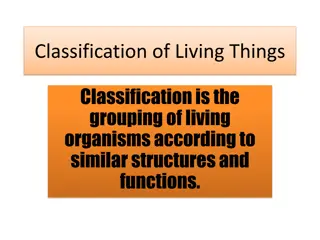Evolution and Plant Systematics Lecture Overview
This lecture outline delves into the concepts of evolution, unity, and diversity of organisms on Earth, covering topics such as fossils, Lamarck and Darwin's theories, adaptation, natural selection, artificial selection, Carolus Linnaeus' systematics, plant evolution, and the demonstration of evolut
4 views • 26 slides
Understanding Taxonomy and Classification in Biology
Scientists use classification to group organisms logically, making it easier to study life's diversity. Taxonomy assigns universally accepted names to organisms using binomial nomenclature. Carolus Linnaeus developed this system, organizing organisms into species, genus, family, order, class, phylum
0 views • 11 slides
Dutch Tulip Mania in the 17th Century: A Historical Overview
Overview of the Dutch Tulip Mania during the 17th century, exploring the economic context, law of supply and demand, background of the tulip craze, and how tulips came to Western Europe. Includes insights on the Dutch Golden Age, the rise and fall of tulip prices, and the influence of figures like C
0 views • 20 slides
Carolus Linnaeus - Father of Modern Botany and his Classification System
Carolus Linnaeus (1707-1778) is known as the Father of Modern Botany for his significant contributions to the field. He developed a systematic way of classifying species, introducing binomial nomenclature. Linnaeus published works like Systema Naturae and Species Plantarum, where he described and cl
0 views • 10 slides
Understanding Classification of Living Things
Explore the fascinating world of classification systems for living organisms, from early methods used by Aristotle to the modern Carolus Linnaeus system with its seven levels. Discover the helpful mnemonic "King Philip Came Over For Grape Soda" to remember the classification order and learn about bi
0 views • 8 slides




